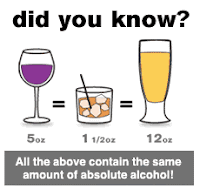Alcohol Facts

Alcohol is the most commonly used addictive substance in the United States- 17.6 million people, or one in every 12 adults, suffer from alcohol abuse or dependence along with several million more who engage in risky, binge drinking patterns that could lead to alcohol problems. More than half of all adults have a family history of alcoholism or problem drinking, and more than 7 million children live in a household where at least one parent is dependent on or has abused alcohol.
Yet, for many people, the Facts About Alcohol and Alcoholism are not clear.
Facts About Alcohol:
Alcohol abuse and alcoholism can affect all aspects of your life. Long-term alcohol use can cause serious health complications affecting virtually every organ in your body, including your brain. It can also damage your emotional stability, finances, career, and impact your family, friends and the people you work with.
To get a better understanding of how devastating alcoholism is in our country, here are a few figures from the Centers for Disease Control and Prevention (CDC):
- 79,000 deaths are annually attributed to excessive alcohol use
- Alcoholism is the 3rd leading lifestyle-related cause of death in the nation
- Up to 40% of all hospital beds in the United States (except for those being used by maternity and intensive care patients) are being used to treat health conditions that are related to alcohol consumption
Over time, excessive alcohol use, both in the form of heavy drinking or binge drinking, can lead to numerous health problems, chronic diseases, neurological impairments and social problems, including but not limited to:
- Dementia, stroke and neuropathy
- Cardiovascular problems, including myocardial infarction, cardiomyopathy, atrial fibrillation and hypertension
- Psychiatric problems, including depression, anxiety, and suicide
- Social problems, including unemployment, lost productivity, family problems, violence including child maltreatment, fights and homicide
- Unintentional injuries, such as motor-vehicle traffic crashes, falls, drowning, burns and firearm injuries.
- Increased risk for many kinds of cancers, including liver, mouth, throat, larynx (voice box) and esophagus
- Liver diseases, including fatty liver, alcoholic hepatitis, cirrhosis
- Gastrointestinal problems, including pancreatitis and gastritis
- Alcohol abuse or dependence – alcoholism.
Alcoholism has little to do with what kind of alcohol one drinks, how long one has been drinking, or even exactly how much alcohol one consumes. But it has a great deal to do with a person's uncontrollable need for alcohol. Most alcoholics can't just "use a little willpower" to stop drinking. The alcoholic is frequently in the grip of a powerful craving for alcohol, a need that can feel as strong as the need for food or water. While some people are able to recover without help, the majority of alcoholics need outside assistance to recover from their disease. Yet, with support and treatment, many are able to stop drinking and reclaim their lives.

Comments